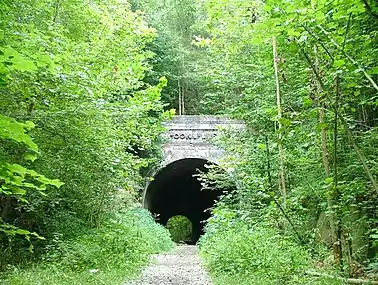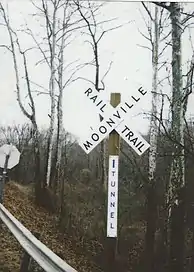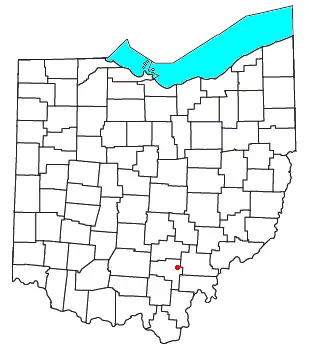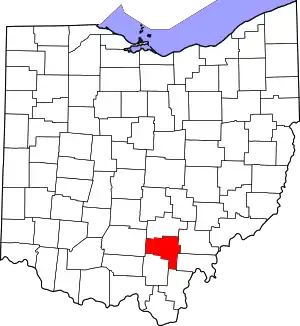Moonville, Ohio
Moonville is a ghost town in southeastern Brown Township, Vinton County, Ohio, United States. Little remains of this former mining community except a few foundations, a cemetery, and an abandoned railroad tunnel which is the subject of numerous ghost stories.



History
In 1856, the Marietta and Cincinnati Railroad (M&C) was pushing through southeastern Ohio to reach Cincinnati. William Cutler, the owner of the fledgling railroad, was having financial problems and was looking to streamline and conserve money while building the railroad.
A man named Samuel Coe convinced Cutler to build the railroad on his large property for free, in exchange for a favor. The railroad would be routed through Coe's land in order to haul coal and clay off of his property. This move saved the railroad a great deal by reducing the distance the railroad traveled to Cincinnati.
Several coal mines sprang up, and it was found that there was a rich supply of it in the immediate area. Soon the mining town of Moonville was born.
Moonville never was a big town, with a peak population in the 1870s of a little over a hundred. It is thought to be named for a man named Moon who once operated a store in the town. The town was isolated in the woods and far away from any other towns; people had to walk the tracks to get from there to the nearest towns of Hope or Mineral. Vinton County is currently the least populated and most heavily forested county in Ohio; in those days it was even more wild and inhospitable.
Walking the tracks was incredibly dangerous, and was made even more hazardous by two long trestles in the area and the long Moonville tunnel. One trestle stood over Raccoon Creek less than 50 yards (46 m) away from the tunnel mouth. By 1920, six people lost their lives on the bridges or within the tunnel. The last fatality was reportedly in 1986, when a 10-year-old girl was struck by a locomotive on that trestle directly in front of the tunnel. However, there is no record of the 10-year-old girl's death online, and the NTSB search tool returns no rail/pedestrian fatalities reported in Vinton County in 1986.
In 1887 the M&C was bought out by the Baltimore and Ohio Railroad (B&O). It quickly became part of a vital line from St. Louis to Washington, DC. Train traffic increased dramatically, while the town entered a decline from which it never recovered. By the turn of the century the coal mines slowly started to be used up and closed down. The last family left town in 1947; by then the town itself was abandoned. By the 1960s all the buildings were gone and there was little to mark the site, other than the town cemetery and the tunnel.
More recently, two people visiting the ghost town Moonville fell on the tracks to their deaths. Two locks were placed on the gates of the bridge in memoriam.
Legends
The legends of the Moonville Tunnel include several spooky tales of ghosts that still haunt visitors to this day. The legends include 4 different ghosts. Those ghosts are named by The Engineer, The Brakeman, The Lavender Lady, and The Bully.
The Engineer
The Engineer is believed to be the ghost of an engineer that died due to a tragic head-on train collision. It is said that the engineer could only see a bright light before his life was tragically taken. News reports have reported on engineers stating that observers may see a ghostly figure wearing an all white robe, holding a lantern which emits a blinding light. This type of sighting involves seeing the ghostly figure walk across the tracks and then vanish.
The Brakeman
The Brakeman is believed to be the ghost of a drunken young man who was working on a train as a brakeman. The young man had consumed too much liquor one night and fell off the train where he would horrifically die. The legend says that visitors have seen a ghostly figure holding a lantern while walking alongside the track and through the tunnel. Visitors have also taken pictures of the tunnel and when they got their pictures developed they found a figure in their pictures which they do not remember being there when they took the photo. This pictured figure is believed to be The Brakeman.
The Lavender Lady
Visitors of the Moonville Tunnel have said that they have seen a thin, elderly women walking alongside the trail. They say that as they watch her she seems to cross the trail and then falls but before she can make contact with the ground, she disappears into thin air. Visitors also say that after her disappearance the scent of lavender fills the air. Historians are not sure of the possible identity of the Lavender Lady. There are many stories of women killed by trains near the Moonville Tunnel, but no single story can be pinned as Lavender Lady’s.
The Bully
The Bully is believed to be the ghost of Baldie Keeton. Baldie Keeton was a resident of Moonville. The legend says that Baldie was a man that liked to fight when he got drunk. The legend also says that one of Baldie’s tactics were to bear hug his opponent. When Baldie was at the saloon he decided to fight, and a group of men kicked Baldie out.
On Baldie’s way home he walked over the Moonville tunnel and a group of men jumped him and ultimately killed him. His body was sent over the side of the tunnel, landing on the tracks. When Baldie’s body was found it looked as if his body had been run over by several trains, and Baldie endured lethal injuries. No one was ever convicted for Baldie’s death.
The legend now says that the ghost of Baldie Newton stands above the tunnel and stares at the approaching visitors. He will sometimes throw pebbles. The legend of The Bully was also told by young mothers to their children and the mothers also used to tell their children to not stay out at night or else "The Bully" would get them.
The demise of the line
With the town long gone, the train traffic continued to increase on the single track line. In 1973 the B&O merged with the Chesapeake and Ohio Railway (C&O) and the Western Maryland Railway (WM) to form the Chessie System. Train traffic doubled, with as many as 14 trains per day.[1]
Railroad workers called the line the most lonesome, desolate eight miles (13 km) of track between Parkersburg, West Virginia and St. Louis. They hated the area because it was isolated and trains seemed to show up without warning. The line was "dark" (unsignaled) between Parkersburg and Cincinnati, and traffic was governed by train orders.[1]
In 1981, a signal was erected at Moonville. The railroad said that if a railroad worker needed to stop a train, they had to use this signal, not a flashlight or lantern. Engineers and conductors were ordered not to go into emergency unless the signal was red.
In June 1985, CSX announced that the line between Cumberland, Maryland and Cincinnati would be reduced to secondary status, and the last scheduled freight train passed through Moonville in August. Trains continued to run until the line was abandoned and the rails pulled up in 1988. The area remains accessible and the old roadbed provides access to the tunnel. Plans to turn the area into a formal rail trail, the Moonville Rail-Trail, have been implemented. Six and a half miles of trail are currently open, with nine and a half miles, plus twelve bridges, still needed.[2]
Events
Midnight at Moonville: Halloween and ghost themed festival located on the old railroad bed and in the tunnel.[3]
References
- DePeel, Kirk (October 1993), Ghost of Moonville, retrieved 2007-06-23
- Tax Write-Off Lynchpin to Corridor Purchase, Ghost Stories Free.
- https://vintoncountytravel.com/midnight-at-moonville/
